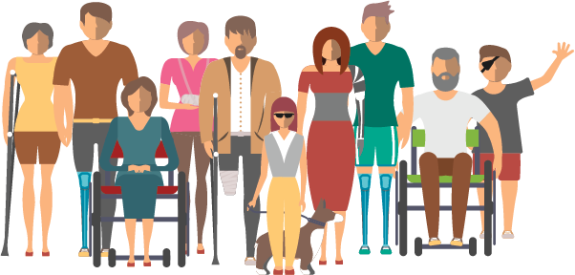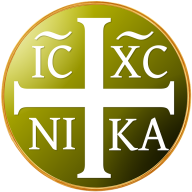
I am grateful for the discussion of disability that Father Isaac Skidmore [On Mental Health Referrals by Orthodox Clergy] and Monica Spoor [One Woman’s Story: Mental Health, Autism, and Orthodox Pastoral Care] have begun on Orthodoxy in Dialogue. It is a topic as near to my heart as my own children. They are what my husband and I used to call high-maintenance kids. Between them, they have autism, ADHD, asthma, bipolar disorder, chiari malformation, chronic migraine, dyslexia, generalized anxiety disorder, post-traumatic stress disorder, prosopagnosia, restless leg syndrome, and some other diagnoses I’m sure I’m forgetting. They’re all adults now, although the two with autism still require our support.
And I can second everything that Monica and Father Isaac said about autism and mental illness.
When I have spoken with people with disabilities and their parents, I hear the same stories over and over. People in our parishes struggle to welcome and love people with disabilities. And people with disabilities struggle to stay in our parishes.
Let me explain …
In the Church, we often experience life as William Wordsworth experienced poetry, as strong emotion recollected in tranquility. The rhythm of feasts and fasts, the repeated actions of lighting candles and venerating icons, the words of prayers we know by heart, the smell of incense and the sounds of hymns chanted in familiar tones—all of this provides spiritual tranquility. It gives us a place where we can take the strong emotions of our lives, the fear and pain, the joy and exultation, and integrate them into a living verse of praise to God.
But what if you experienced the Church, not as a place of tranquility, but a place of torment?
What would it be like if, when you received the Holy Gifts from the chalice, your throat began swelling and you broke out in hives? And when you explained that you have anaphylaxis from wheat, you were assured that you couldn’t possibly suffer ill effects from the Holy Mysteries, as they are the very Body and Blood of our Lord?
What if your child had neuromuscular disorder, and received a blessing from your priest to sit for the service. And one of the older women rebuked your child for sitting, and when your child said, “I have a blessing from Father,” the woman told him he would go to hell for lying about such a thing?
What if you had a movement disorder that caused involuntary vocalizations, and your embarrassment was exacerbated by being repeatedly shushed by the people around you?
What if your child reacted to a sudden noise during a service with a flight-or-fight reaction, and while you were trying to calm her, your priest stepped out from behind the iconostasis and told you to take your child out? So you are diligent about taking your child out when she is distressed. And a few weeks later, your priest rebukes you for going in and out during the service. What can you do?
What if you had a seizure disorder, and your priest informed you that your service dog, who alerts you to seizures before they occur, could not enter the nave with you?
What if you were told that your child, because of his disability, was not welcome to attend Sunday school or youth activities?
What if, every time you walked in the door of the church, the incense caused you to have an asthma attack that required you to use an inhaler that keeps you breathing, but makes your heart race and your hands tremble?
What if your 12-year old child is still in diapers, and when you ask that a changing table be provided, you’re told that it’s too expensive?
What if the fluorescent lights throughout the church building trigger migraines, and when you ask the priest and parish council whether it’s possible to change the lighting, and you’ll even pay for the changes, they tell you that it’s impossible?
What if you can’t attend parish feasts or even coffee hour because peanuts and walnuts are everywhere in the fellowship hall, and you don’t want to have to call an ambulance for your child?
What if you used a wheelchair and you literally couldn’t even get in the door?
These are all common experiences of Orthodox Christians who are fighting, week after week, to attend the divine services and to be part of the Body of Christ.
And they were the experiences of many, many more who used to attend our parishes, and who gave up fighting. They could find more peace, more tranquility, more love, if they just stayed home.
We don’t know how many people have been lost to our parishes because we have failed to love them. But we can guess.
About 1 person in 25 has life-threatening allergies, to food or to environmental allergens. How many people in your parish carry an EpiPen?
About 1 person in 15 has a significant mobility issue. How many people in your parish use crutches, a walker, or a wheelchair?
About 1 person in 13 has asthma. How many people in your parish have asthma?
About 1 person in 10 has diabetes. How many diabetics are at your parish?
About 1 person in 6 has a developmental disability, ranging from speech and language impairments to cerebral palsy or autism. How many people in your parish have developmental disabilities?
About 1 person in 5 has some form of mental illness. How many people in your parish receive mental health care?
If you assume that Orthodox Christians are no more or less likely to have a disability than the population at large, then the membership at our parishes should reflect the population numbers. In other words, at a typical Orthodox parish, with about 100 people attending on a Sunday morning, you would expect to have 4 people with life-threatening allergies, 6 or 7 who use mobility aids to get around, 7 or 8 who have asthma, 10 who have diabetes, 16 or 17 who have developmental disorders, and about 20 who are mentally ill.
Because people with disabilities are so often socially isolated, if a parish were truly welcoming, they would likely be at our parishes in even higher numbers.
Given the numbers, you might find yourself wondering where the people with disabilities are, if they’re not at your parish. Or, given the experience that so many people with disabilities have in our churches, you might wonder why any of them stay.
I can tell you why I stayed. I told myself that my children needed the Church for their salvation. And the Church, our parish, needed my children for their salvation. To be saved, to achieve theosis, you have to learn to love as God loves. And my children gave people the opportunity to learn the kind of selfless, self-emptying, divine love that could make them like God.
But if I had to do it over again, I’m not sure that I would. Because my children no longer have a relationship with the Church. As they got older, they came to understand how badly they had been treated, even by people they had trusted and loved. I couldn’t hide it from them; they were there. They experienced it. They lived it.
If they had chosen that kind of sacrifice, for the love of people who didn’t know how to love, then it would have been worth it. But I imposed the sacrifice on them. And all I can do for them now is love them, and pray that God will accept the sacrifice for their salvation, and heal them with His love.
And I can do my best to help others understand that the Gospel requires that we treat every single human being as if they are an icon of the Most High God. Because of the Incarnation, our Lord’s humanity is so tied up with ours that everything we do to another person, we are in fact doing to Him.
So I wasn’t entirely wrong. If we want to entertain angels, we have to love people who aren’t like us. If we want to be like God, we have to love as God loves. We have to learn how to love people with disabilities. We have to. We have no choice.
Start by counting. How many people with disabilities attend your parish every week? If the answer is few or none, you have work to do.
Find the people with disabilities that you do have. Listen to them. Really listen. Find out what they need to feel welcome at your parish. And then do that. Every week.
It might be as simple as learning their child’s name, speaking to them kindly every time you see them, and bringing the parents a cup of coffee at coffee hour while they tend to their children’s needs.
It might be as complicated as finding a way to make coffee hour and feasts safe for someone with life-threatening food allergies, or as expensive as installing new restrooms and ramps.
Whatever it takes, love will find a way.
Welcome the ones who are in your midst already. Serve their needs. And then reach out.
So many people with disabilities, and their families, feel isolated and judged. You can change that. You can make them feel welcomed and loved.
Charlotte Riggle is an Orthodox Christian whose day job is senior program manager for Amazon, where she helps ensure that software designers and developers know how to make their work accessible for people with disabilities. She is also the author of two picture books, Catherine’s Pascha and The Saint Nicholas Day Snow [which Orthodoxy in Dialogue reviewed here]. She writes about the Orthodox faith, disability, and picture books at Charlotte’s Blog.


Pingback: ORTHODOXY AND DISABILITY: THE CONVERSATION CONTINUES by Monica Spoor | ORTHODOXY IN DIALOGUE
Pingback: IN CASE YOU MISSED IT: SEPTEMBER | ORTHODOXY IN DIALOGUE
Pingback: “Disability in the Orthodox Parish: A Call to Love,” by Charlotte Riggle | Arms Open Wide